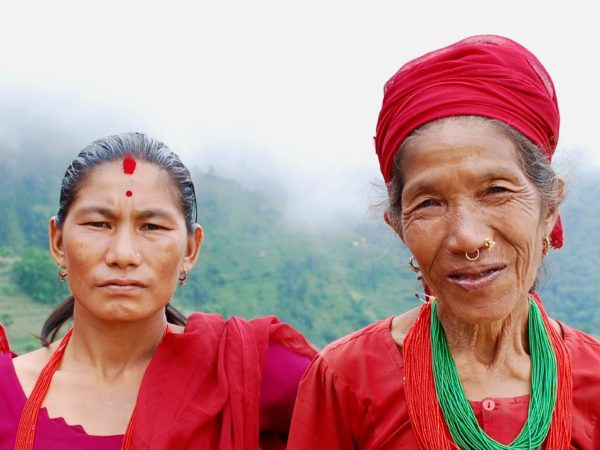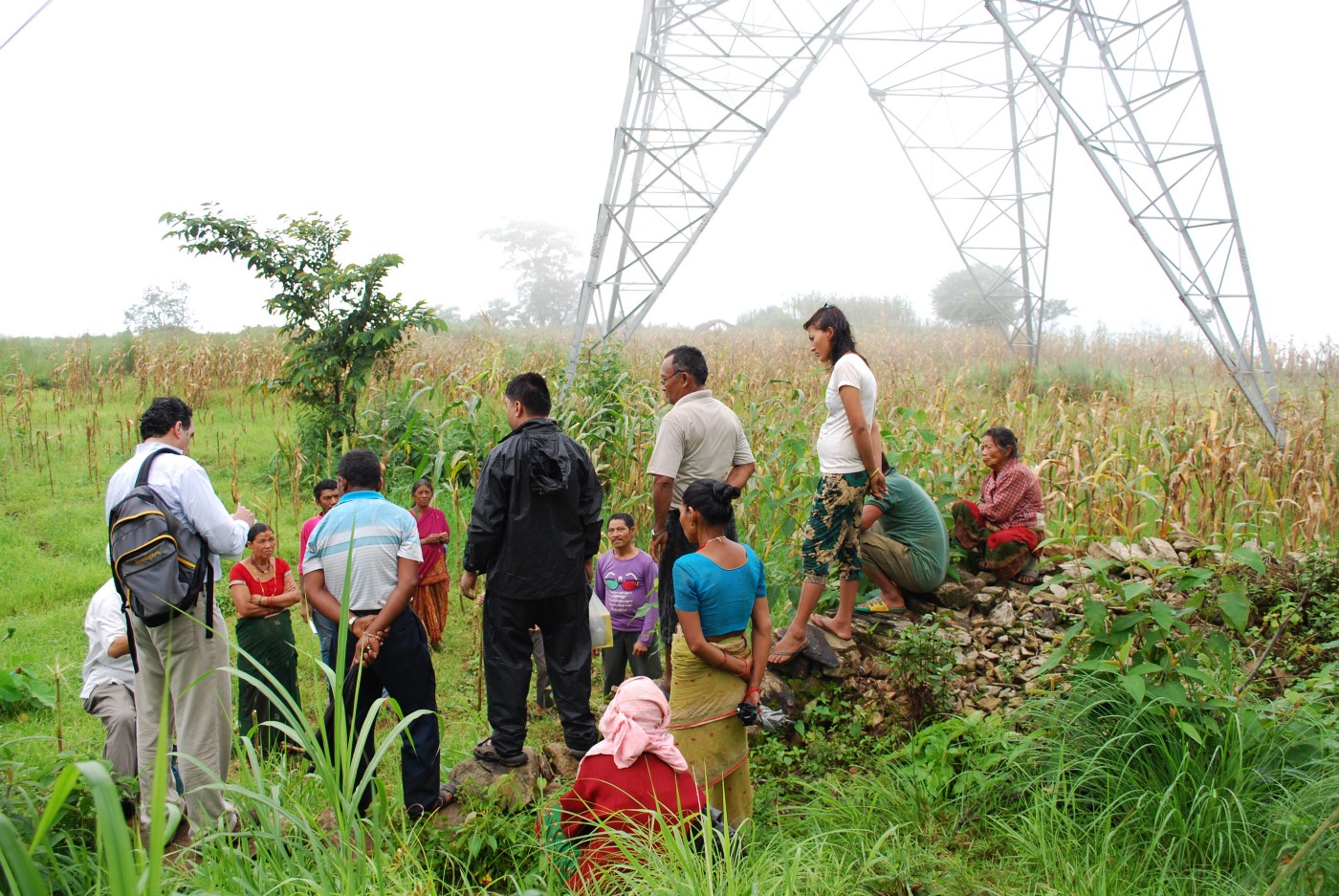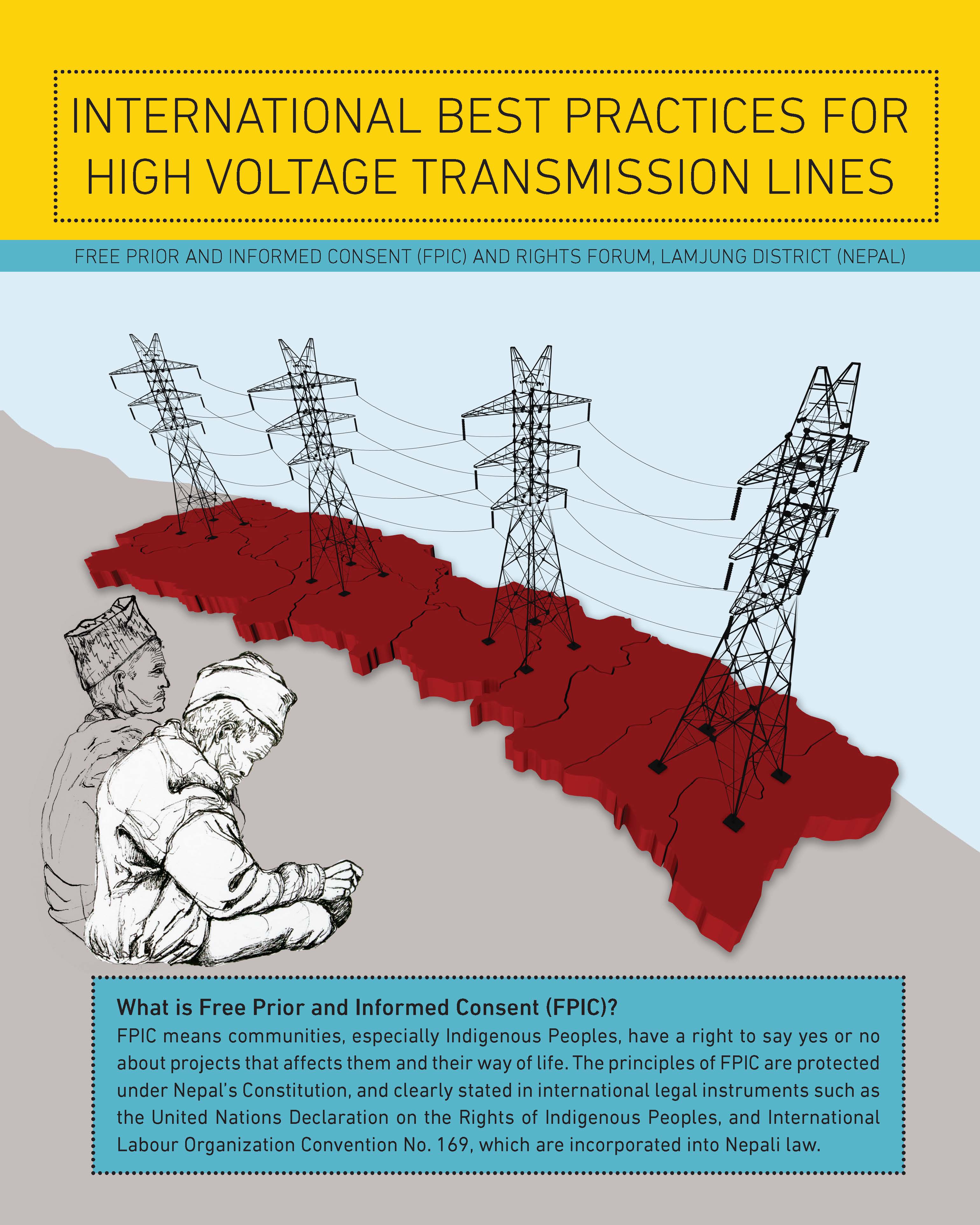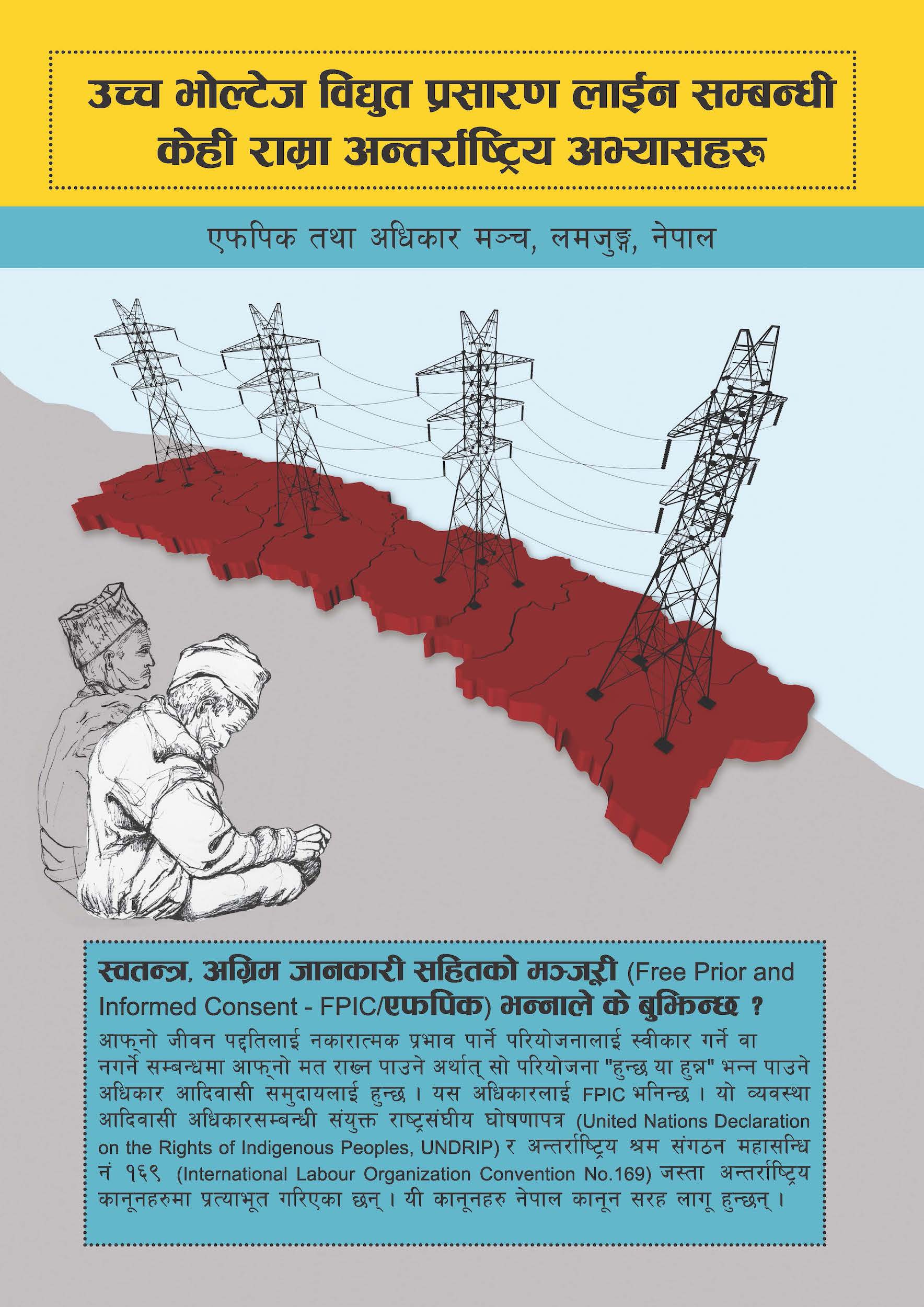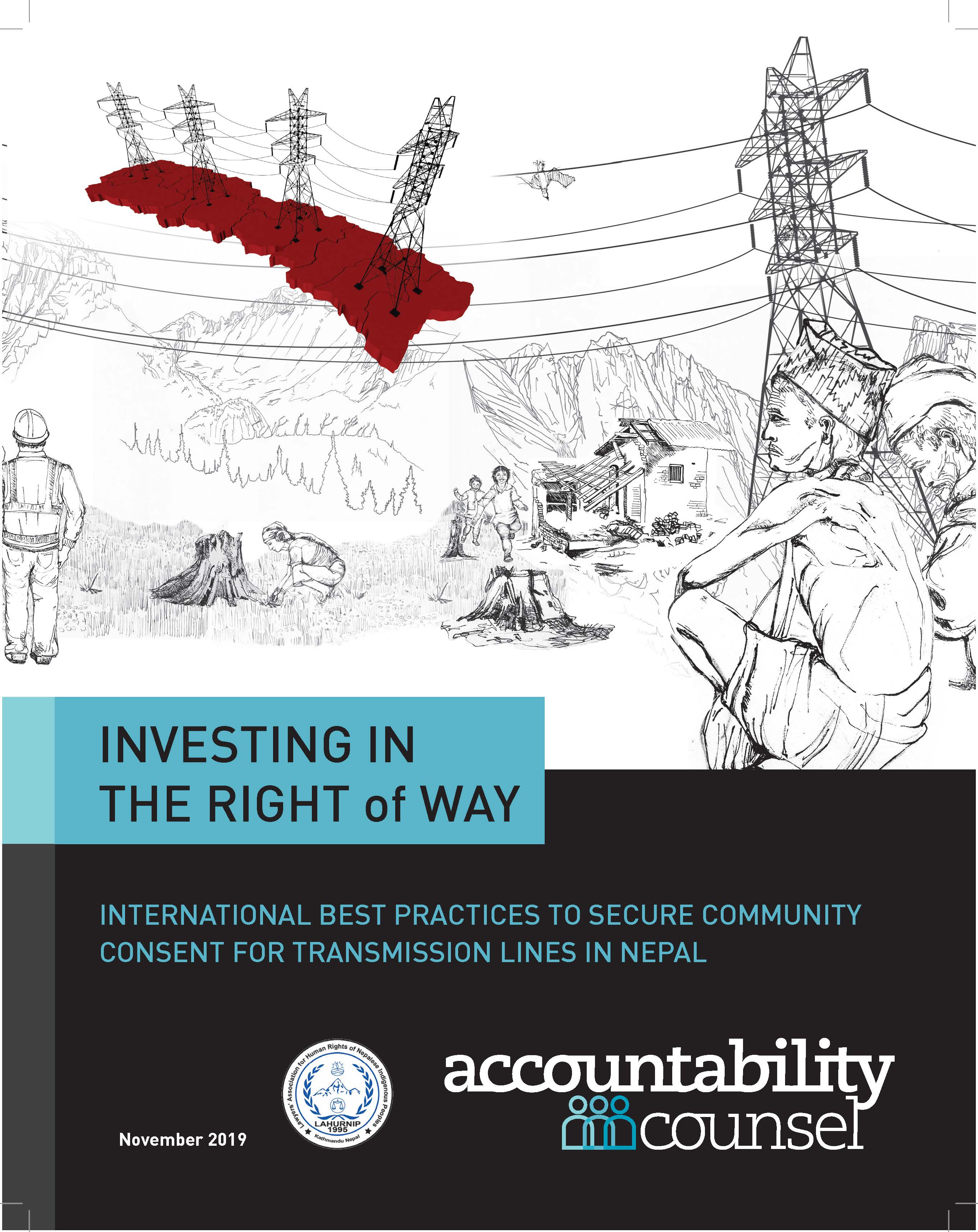Nepal: Khimti-Dhalkebar Transmission Line
-
Overview
Accountability Counsel, together with the Lawyers’ Association for Human Rights of Nepalese Indigenous Peoples (LAHURNIP), supported communities in the Sindhuli District in Eastern Nepal who are affected by a World Bank-financed high-voltage transmission line. Nepalese armed police forces have violently beaten and arrested peaceful protesters, and the World Bank was complicit in a cover-up of those abuses. Our work ensured a full compliance investigation by the World Bank Inspection Panel that documented the violations of Bank policy.
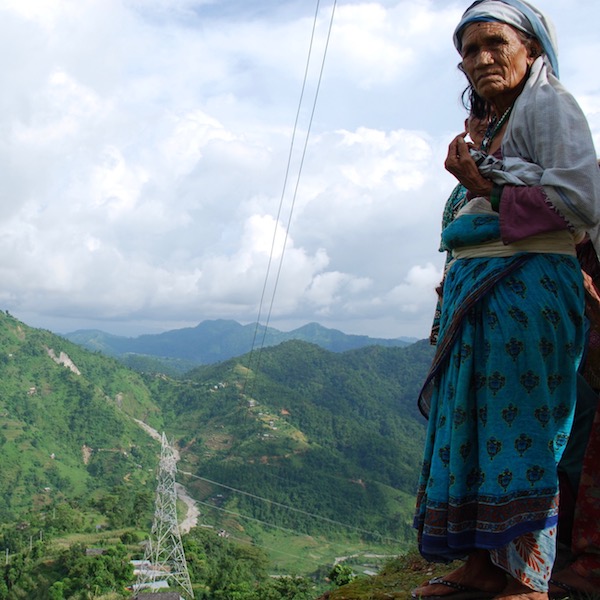
A Nepalese woman in Sindhuli District, Nepal overlooking the Khimti-Dhalkebar Transmission Line
Indigenous, Dalit, and other local communities have serious concerns about the health, safety, and economic impacts of the Khimti-Dhalkebar 220 kV Transmission Line, a high-tension transmission line. People with land and structures directly under the route were not informed about the project or consulted on its implementation.
The communities sought a rerouting of the line away from their communities, homes, and schools. Now that the line has been built, many have still not been adequately compensated.
Accountability Counsel supported the communities in their complaint to the World Bank Inspection Panel, and helped produce the report Livelihoods on the Line to ensure that the Bank’s board was prepared to understand and evaluate the coming Inspection Panel report. The Panel released its investigation report in 2015 concluding that the Bank violated its own policies.
We accompanied the communities through every step of the Panel process, and beyond, to ensure that the communities’ voices were heard directly by the Inspection Panel, World Bank leadership, and the Nepalese government. We called on the Bank to take responsibility not only for its own policy violations surrounding the Khimti-Dhalkebar Transmission Line, but also for its complicity in covering up the human rights abuses committed by the Nepalese government.
While our active work on the Khimti-Dhalkebar case ended in November 2017, we continue to work closely with our partners LAHURNIP who are in close contact with Sindhuli residents as they engage with the government of Nepal.
We also supported communities through the Bank’s access to information process, which resulted in the release of a report by international dispute-resolution expert, the Consensus Building Institute (CBI) in October 2018. The CBI report’s release is a vindication of the community’s demands after the Bank refused disclosure for two years.
Read more about the Inspection Panel
“Our heritage and livelihoods are tied to this land. The land seized for this project has already forced people to move, leaving them with nothing.” — Sindhuli District resident Surendraswor Moktan
-
The Story
The Khimti-Dhalkebar 220 kV Transmission Line is a high-tension transmission line that runs through five districts in central Nepal and has impacted more than 114,000 people. The World Bank board approved funding the project in 2003 as part of the Nepal Power Development Project (NPDP). The Nepalese Electricity Authority (NEA) completed construction of the line in January 2017 after delays due to opposition from affected communities.
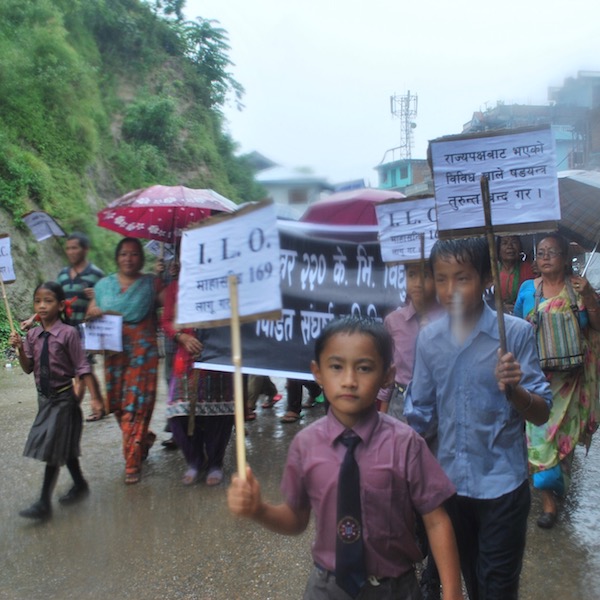
The Problem
Affected community members, including Indigenous Peoples, Dalits, women, and other marginalized groups, have had various concerns about the project from its outset. The route for the transmission line covers residential and urban areas, as well as a number of schools. In violation of World Bank policy, the affected communities located directly under the route were not informed or consulted. There was a lack of information and consultation about the project design, potential health, safety, and environmental impacts, and inadequate compensation for livelihoods lost as a result of the line. As a result, the communities sought a rerouting of the line.
Peaceful community protestors voicing these concerns were met with violence. In a 2012 protests, armed police beat local women so severely that some still suffer from the injuries. Threats of violence and intimidation by the NEA continue, creating anger, frustration, and sadness for the affected people, but the people are determined to stand their ground.
For nearly a decade, there was virtually no direct communication from the NEA or the World Bank to affected communities despite the communities’ primary demand for clear information and participatory consultation. Communication materials were distributed only in March 2014, and, even then, these emphasized the positive aspects of the project and failed to discuss negative impacts and risks. Eventually, when World Bank and NEA officials did meet with the affected people they dismissed the concerns raised and instead redirected the conversation to monetary compensation.
In early April 2016, the Government of Nepal deployed armed police forces to Sindhuli District to ensure opposition to the project did not obstruct surveying and construction activities. In April 2016 and, later, in July 2016, the police beat and detained community members who were peacefully opposing the project. Both times, community members were released from prison only after agreeing under duress to sign their “consent” to the project.
Steps to Demand Justice
Through the Kathmandu-based Lawyers’ Association for Human Rights of Nepalese Indigenous Peoples (LAHURNIP), affected communities approached the Supreme Court of Nepal in an attempt to suspend the project until all social and environmental impacts were addressed. After these attempts to appeal to national political and judicial processes, they contacted Accountability Counsel. Since then we have been working alongside LAHURNIP to support Sindhuli communities to voice their concerns to the World Bank.
On 10 July 2013, the communities filed a complaint to the World Bank’s accountability mechanism, the Inspection Panel. The complaint raised concerns about human rights violations associated with the construction of the transmission line. The complaint demanded that the Inspection Panel immediately investigate the Bank’s role in this project. Communities also demanded that the Bank halt construction of the transmission line and that the Nepalese Government cease violence against local people who have spoken out against the project.
“We have no other option but to struggle. All of our land is here. We have been living here since the beginning of human development in this region.” – Sindhuli Resident
The Inspection Panel’s Investigation
In October 2013, the Inspection Panel issued their report and recommendation that a full investigation be carried out into violations of World Bank policies during the planning and implementation of the transmission line. The report made requirements for investigating possible alternative project designs.
However, instead of immediately opening such an investigation, the Inspection Panel announced that the investigation would begin after 30 April 2014. The rationale for this delay was to provide World Bank staff time to extend their participation in the project, which was scheduled to close on 30 December 2013, and to allow Bank Management the chance to implement an action plan to address community concerns. Accountability Counsel immediately expressed concern that the Panel’s failure to promptly investigate would make the situation worse – and it did. The Panel commenced their investigation in May 2014 and visited affected communities in July 2014. During the lengthy time it took for the Panel to complete its investigation, the situation deteriorated in Sindhuli.
In April 2015, Accountability Counsel produced the report Livelihoods on the Line in order to ensure continued engagement by the World Bank Board and Management.
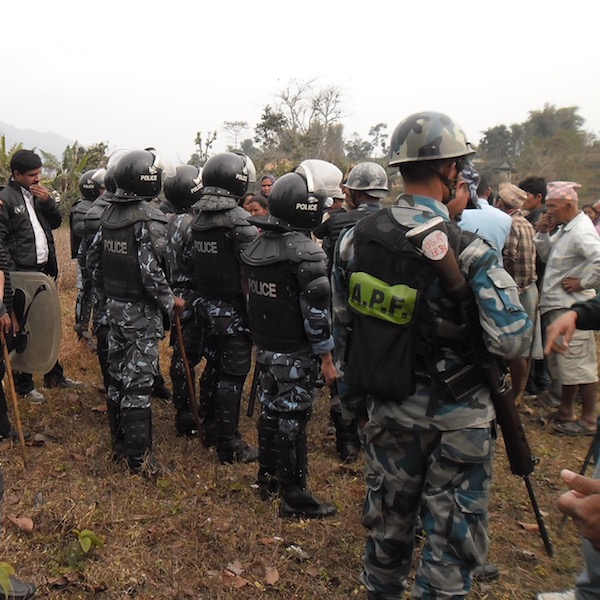
The Inspection Panel’s Findings
On 10 July 2015, the Inspection Panel released its findings, concluding that the World Bank had violated several of its policies in the implementation of the Khimti-Dhalkebar Transmission Line Project. Violations included failure to inform and consult affected communities, assess alternative routes for the transmission line, assess the capacity of the local agency implementing the project, and provide adequate resettlement support for forcibly displaced families.
In response, the World Bank released an action plan, which was intended to bring the project into compliance with Bank policies. Many of the Bank’s proposed actions were forward-looking and did not adequately address the violations and harm caused in this project.
Further Violence in 2016
During the first week of April 2016, the Government of Nepal indicated that it wanted to restart the project construction that had been halted due to community complaints of lack of information and consultation on their forced displacement. This led to community protests on 10 April 2016 with about 160 people taking part in a peaceful sit-in outside government offices. On the morning of April 10, several sit-in leaders were invited inside to discuss their demands. Upon exiting the offices after this discussion, six of them were arrested. They were released the following day but only after they were forced to sign documents giving their consent to the project. Also on 10 April 2016, police forces were sent to disperse protesters, and several dozen people were injured. Photos of these events from a local news agency are found here.
Following Accountability Counsel’s trip to Nepal to investigate the violence, on 7 July 2016, LAHURNIP and Accountability Counsel sent a letter and briefing paper to the World Bank President and the Board, strongly urging them to counter intimidation and militarization in the project.
Steps Toward Facilitated Dialogue
In May 2017, after nearly two years of Accountability Counsel’s consistent advocacy, a World Bank-supported facilitator began work to address the dispute between the Government of Nepal and Sindhuli communities. Over a period of 1.5 months, there were three facilitated meetings between the NEA project team and Sindhuli Struggle Committee leadership. Newly elected local government officials, including the mayor, participated in this dialogue to support their Sindhuli constituents. However, without notice or explanation, the World Bank refused to continue funding the facilitator, and the process came to an abrupt end.
While Accountability Counsel’s active role has come to an end, we continue to closely follow and communicate with LAHURNIP and the residents of Sindhuli.
“They never tried to understand our concerns. Perhaps they wish to force the transmission line to be constructed over our tears…” – Sindhuli Resident
Learn more about the Inspection Panel process in this case and our impact.
Steps after case closure
Even after closing the case, we supported Sindhuli communities through the World Bank’s access to information process. The communities were seeking disclosure of a report by international dispute-resolution expert, the Consensus Building Institute (CBI). The CBI report was commissioned by the Bank as a direct response to the dispute between the local communities and government authorities. Our support to Sindhuli communities resulted in the release of CBI’s report in October 2018. The CBI report’s release is a vindication of the community’s demands after the Bank had refused disclosure for two years.
Case Partners
Accountability Counsel provides support to indigenous communities and grassroots organizations in Nepal in partnership with Kathmandu-based Lawyers’ Association for Human Rights of Nepalese Indigenous Peoples (LAHURNIP).
-
The Case
-
Oct 2018
The Appeals Board decided that the World Bank was improperly restricting access to an expert report by the Consensus Building Institute (CBI), resulting in the Bank’s release of the report.
-
Aug 2017
Accountability Counsel and LAHURNIP supported the communities to initiate a formal request, under the World Bank’s Access to Information Policy. The request was for an expert report about conflict resolution in Nepal’s energy sector, that had been commissioned as a result of the communities’ complaint to the Inspection Panel. Denial of this initial request led to the filing of an appeal to the World Bank’s Access to Information Committee. Denial of the first level appeal to led to the filing of a second level appeal to the Access to Information Independent Appeals Board.
-
Mar 2017
A facilitator was hired to moderate a dialogue between residents of Sindhuli and the Government of Nepal.
-
Aug 2016
Community members sent a letter to the World Bank President and the Board, urging the World Bank to correct misrepresentations in the implementation of its action plan and reiterating the urgent need for a facilitated dialogue.
-
Jul 2016
LAHURNIP and Accountability Counsel sent a letter and briefing paper to the World Bank President and the Board, strongly urging them to counter intimidation and militarization in the project.
-
Jul 2015
The Inspection Panel releases its findings, accompanied by a report and action plan from the World Bank’s Management.
-
Apr 2015
Accountability Counsel produced the report Livelihoods on the Line in an effort to ensure continued engagement by the World Bank Board and Management. Accountability Counsel also met with Board members to discuss the report.
-
Jan 2014
For an entire year, Accountability Counsel advocated with the Inspection Panel, urging the World Bank accountability office to complete its investigation report.
-
Nov 2013
-
Jul 2013
With the support of LAHURNIP and Accountability Counsel, communities filed a complaint to the Inspection Panel on problems associated with the Khimti-Dhalkebar 220 kV Transmission Line.
-
Apr 2013
LAHURNIP filed a second writ petition to the Supreme Court of Nepal addressing land acquisition for road projects associated with the Khimti-Dhalkebar Transmission Line.
-
Apr 2013
The government of Nepal sent armed police forces to Sindhuli to resume construction activities on the transmission line.
-
Mar 2013
Community leaders met with World Bank staff in Kathmandu.
-
Feb 2013
Affected communities sent a letter of concern to the World Bank President.
-
Jan 2013
LAHURNIP filed a writ petition to the Supreme Court of Nepal requesting an interim order to halt construction of the project.
-
Dec 2012
World Bank Background Documents were released:
-
Nov 2012
Communities peacefully protested the Khimti-Dhalkebar 220 kV Transmission Line, resulting in a police charge and injuries to at least ten protesting women.
-
-
Impact
When Accountability Counsel was first contacted by LAHURNIP and communities, the practice in Nepal was to not provide any compensation for land in the right of way of transmission lines. However, as a result of the communities’ advocacy, the government provided ten percent of the value of the land under the right of way as compensation for the entire Khimti-Dhalkebar transmission line. And for the 3.85km stretch of the transmission line passing through Sindhuli district, where the community movement was strongest, the government provided affected landholders over hundred percent of the land value. Additionally, now, when the Nepalese government builds or authorizes a new transmission line, the practice is to start by offering ten percent compensation.
Accountability Counsel’s continued advocacy in the case resulted in the hiring of an independent facilitator to moderate a dialogue between the affected communities and the government-owned project implementing agency, the Nepal Electricity Authority. Our Asia team accompanied the community members through several training workshops to prepare them for the facilitation process. This dialogue marked the first time the government of Nepal has engaged in a collaborative dispute resolution process with communities affected by its development efforts.
Our advocacy also resulted in a record of the abuses and violations experienced by the communities. This record has been documented through our own work and the World Bank Inspection Panel’s compliance report and recommendation. This report was presented to the Bank’s Board of Directors, reviewed by Bank Management, and is now a public document.
We also helped the communities to inform all levels of World Bank staff and leadership of the Bank’s failures in due diligence and consultation that led to the extreme delays in construction of the transmission line, as well as environmental and social consequences for vulnerable local populations in the Sindhuli district.
While our active role ended in November 2017, we continue close contact with LAHURNIP as they support the people of Sindhuli in their advocacy with the Nepalese authorities.
For example, we supported communities through the Bank’s access to information process, including an initial request, and two levels of appeal, while also applying public pressure. The communities’ and our efforts through the two year process resulted in the release of a report by international dispute-resolution expert, the Consensus Building Institute (CBI) in October 2018. The CBI report’s about transmission line disputes in Nepal independently validated the communities concerns and was a vindication of the community’s demands for better information disclosure, consultation, compensation and non-cash benefits.
Accountability Counsel is now working on a second transmission line case in Nepal, supporting communities who are advocating for further improvements on how transmission lines are implemented.
-
Case Media
Videos
21 February, 2018 Interview on Indigenous Television, Nepal's first indigenous community television station.Media Coverage
- 19 May 2017 Lowenstein Clinic Releases Report on World Bank Inspection Panel By Yale Law School
- 5 March 2017 Nepal: Indigenous Locals Demand that Development Projects Respect Their Rights By Dev Kumar Sunuwar, Minority Voices Newsroom
- 1 March 2017 Power to the People… At What Cost? By Dev Kumar Sunuwar, Cultural Survival Quarterly Magazine
- 10 August 2016 Nepal: respect the rights of communities affected by World Bank project By ESCR-Net
- 5 May 2016 In Nepal, Fighting for The Rights of Indigenous Peoples By the Coalition for Human Rights in Development
- 12 April 2016 Khimti-Dhalkebar transmission line construction resumes By the Himalayan Times
- 21 February 2016 Oli, Modi inaugurate power line By Prithvi Man Shrestha, Kathmandu Post
- 19 February 2016 NEA conducts final tests on new Nepal-India transmission line By the Himalayan Times
- 17 July 2015 World Bank overlooked families in Nepal project, panel finds By Sasha Chavkin & Ben Hallman, International Consortium of Investigative Journalists
- 15 March 2015 Unsustainable development By Shradha Ghale, The Record
- 11 March 2015 Good intentions gone wrong By Shradha Ghale, The Record
Op-Eds
- 13 December 2019 The case for public reforms to the World Bank’s Inspection Panel
- 22 January 2018 Disappointing dialogue in Sindhuli provides lessons for community participation in Nepal’s development By Siddharth Akali, Accountability Counsel, & Shankar Limbu, LAHURNIP, in The Record
- 22 May 2017 Landmark community dialogue in Nepal: Is the World Bank learning? By Siddharth Akali, Accountability Counsel, & Shankar Limbu, LAHURNIP, in the Bretton Woods Observer
- 5 April 2016 Powerless: a call for World Bank community engagement in Nepal By Komala Ramachandra, Accountability Counsel, & Shankar Limbu, LAHURNIP, in the Bretton Woods Observer
- 31 March 2014 Disempowered development: Violating rights in Nepal for energy transmission By Komala Ramachandra, Accountability Counsel, & Shankar Limbu, LAHURNIP, in the Bretton Woods Observer
Blog Posts
- 5 February 2019 Gaining Access to Information: The Case of Nepali Communities & The World Bank By Siddharth Akali, Accountability Counsel and Shankar Limbu, LAHURNIP
- 12 December 2018 Protecting Defenders in Development: Lessons Learned from Nepal By Siddharth Akali, Accountability Counsel and Shankar Limbu, LAHURNIP
- 28 September 2018 Gaps in World Bank’s Access to Information Approach are Failing Nepali Communities and Perpetuating Violence By Siddharth Akali, Accountability Counsel & Shankar Limbu, LAHURNIP
- 11 July 2017 To Be an “Honest Broker” in Nepal, the World Bank Must Be Fully Honest
- 19 August 2016 World Bank Covers Up Human Rights Abuses in Nepal: Silencing Community Voices
- 11 August 2016 ESCR-Net asks Government of Nepal to Respect the Rights of Communities Affected by World Bank Project
- 29 April 2016 AC Travels to Nepal to Investigate Violence at Peaceful Protest
- 13 April 2016 Nepal Arrests and Beats Peaceful Protesters Over World Bank-funded Power Project
- 6 April 2016 World Bank Engagement in Nepal
- 17 July 2015 Violations in Nepal Tied to Broader World Bank Resettlement Failures
Press Releases
- 22 November 2019 Investors in Nepal’s hydropower sector must address concerns of local communities and Indigenous Peoples
- 22 October 2018 Press Release: World Bank expert’s report says lack of community participation causing conflicts in Nepal’s energy sector
- 14 July 2015 Nepali Communities Seek Justice for Violations in World Bank Project
- 10 July 2013 Nepali Indigenous Groups File Complaint against World Bank Power Line Project
Photos
-
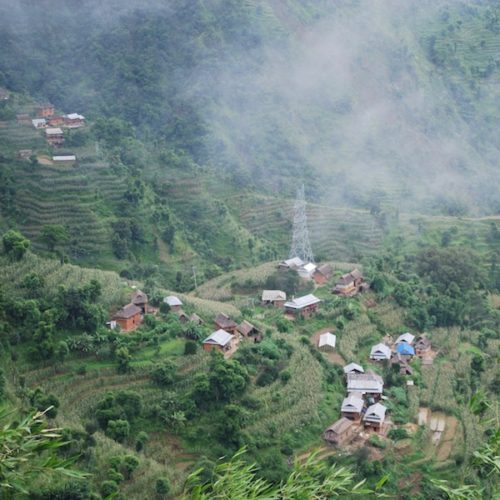
-
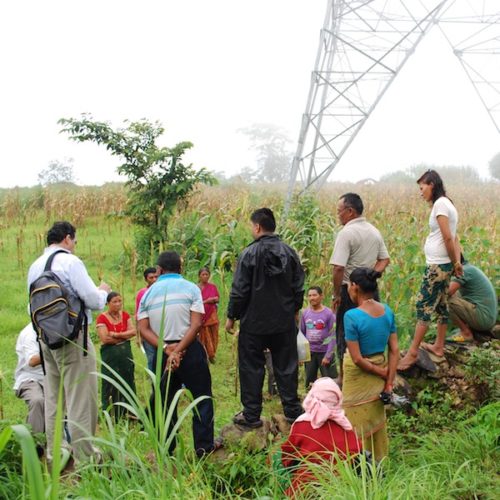
-
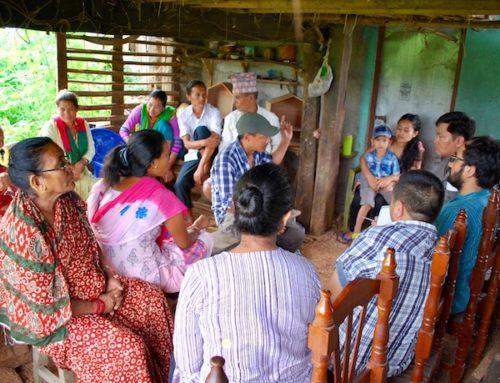
-
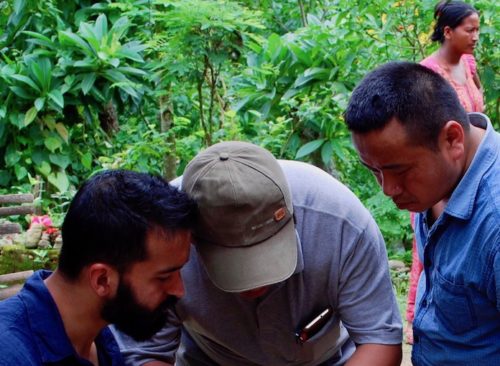
-
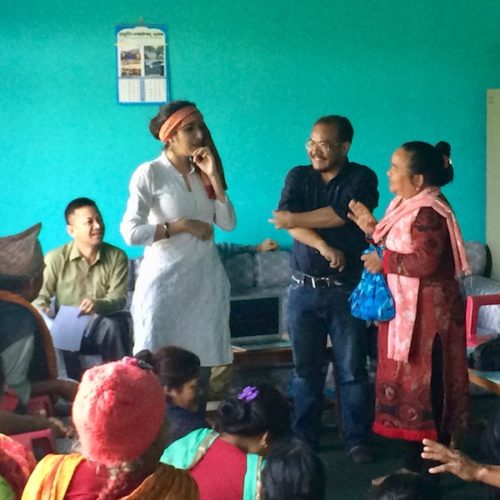 Accountability Counsel's Guneet Kaur leads a training in Nepal
Accountability Counsel's Guneet Kaur leads a training in Nepal -
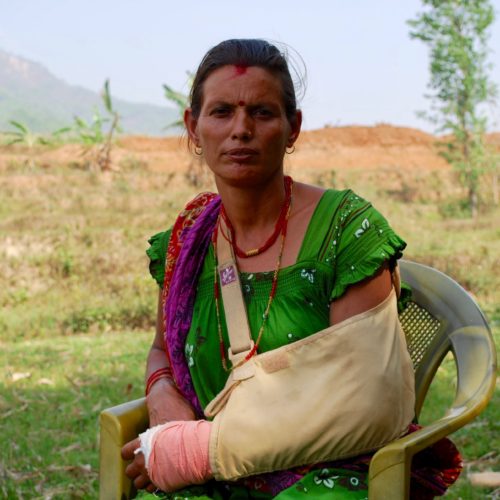
-
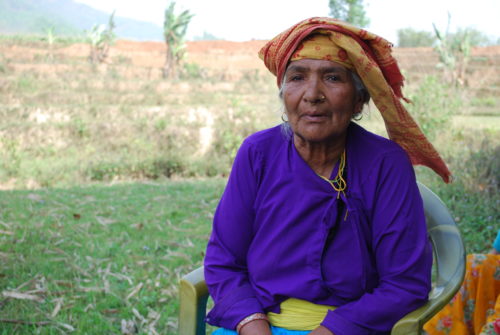
-
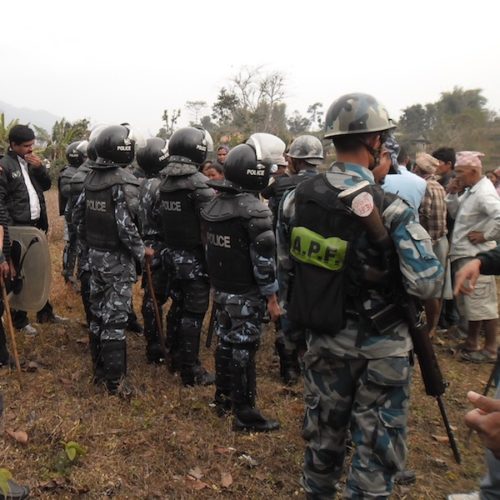 Police turn peaceful protest violent, April 10, 2016 (ABCTVlive)
Police turn peaceful protest violent, April 10, 2016 (ABCTVlive) -
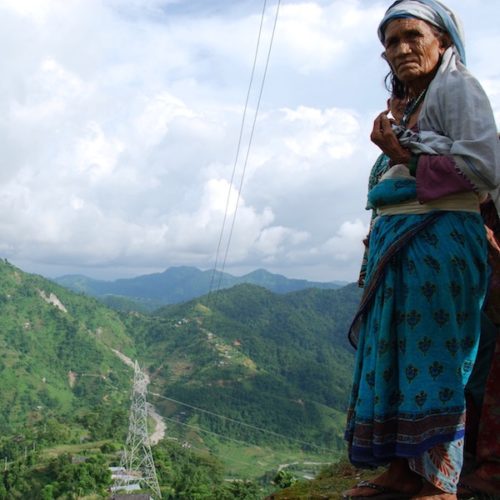 Challenging World Bank Abuses in Nepal
Challenging World Bank Abuses in Nepal -
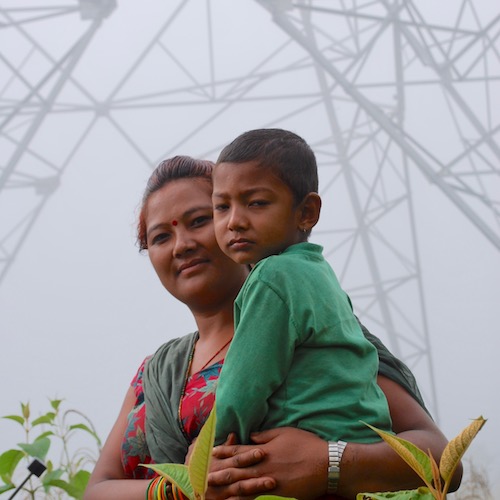
-
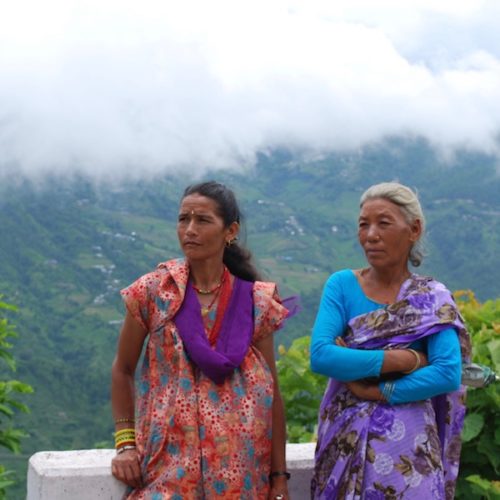
-
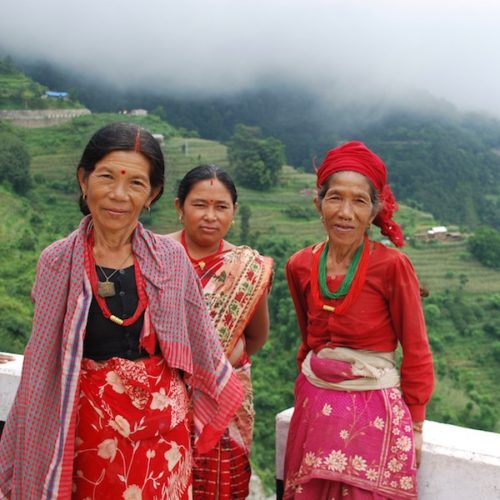
-
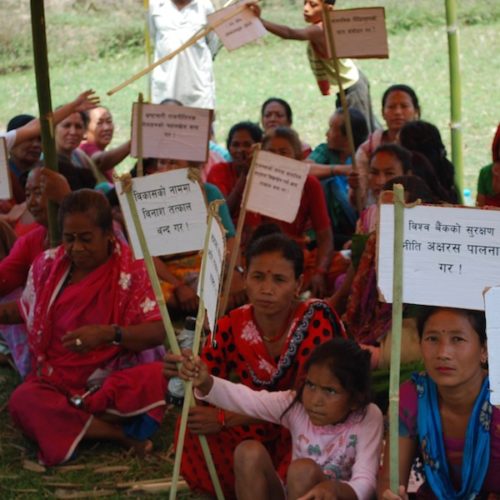 Communities peacefully protesting project implementation
Communities peacefully protesting project implementation

